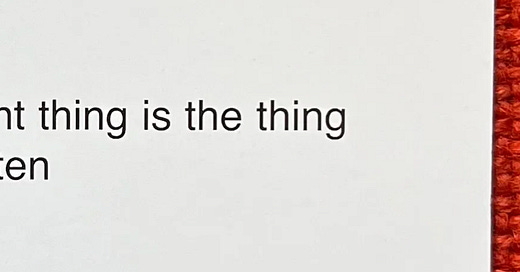This morning, as I worked in The 24-Hour Room’s virtual Studio from 8 to 9 a.m. ET in the inspiring company of a small group of other writers, the day’s prompt got me thinking about how intensely family secrets can impact the worlds of those who are oblivious of them, not through any personal act of forgetting, but the forgetting that happens when a group stops talking about the terrible things — or possibly even the good but complicated things — that have happened in its past. I was working on a small scene in which a mother and daughter’s argument illuminates just one such forgetting, in the hopes that what I wrote might somehow also subtly imply how disastrously common this kind of forgetting is, not just on the personal or familial scale, but the world-historical.
Stephanie’s note for the day references a great example of this, Yoko Ogawa’s novel The Memory Police, where
life on an unnamed island is plagued with disappearances—everything from perfume and stamps to plants and animals. Soon after, all memories of what has disappeared are gone, as well.
In the following passage, the narrator, whose father was an ornithologist, contemplates a bird in the sky, knowing it is the last bird she’ll ever see:
“I tried to hold on to the way it looked in flight or the colors of its feathers, but I knew it was useless. The bird, which should have been intertwined with memories of my father, was already unable to elicit any feelings in me at all. It was nothing more than a simple creature, moving through space as a function of the vertical motion of its wings.”
How do memories function in your narrative? How are they evoked, and why? And what of the people or events that we, as authors, forget in order to survive?
—Stephanie Mankins
Thinking about the forgetting of what’s most important was, for me, a galvanizing reminder of how well fiction can address this tendency, even reverse it — often more effectively than a lecture, op-ed or nonfictional cris de coeur.
Good writing, and I hope you’ll consider joining us weekdays at 8 a.m. Eastern to work in communal silence, doing our best to remember or imagine or even document the forgetting of what’s most important.
—Elizabeth Gaffney and The 24-Hour Room






